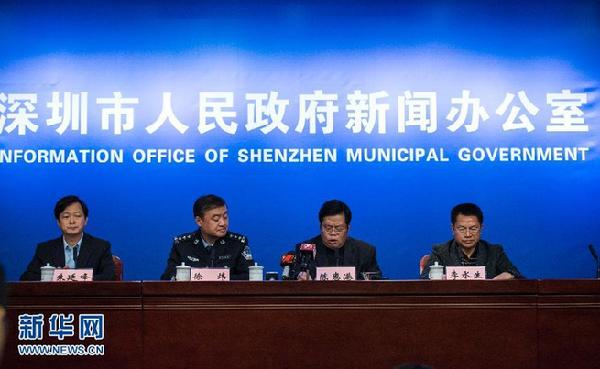Shenzhen restricts car purchases to ease congestion
 0 Comment(s)
0 Comment(s) Print
Print E-mail Xinhua, December 29, 2014
E-mail Xinhua, December 29, 2014
|
Photo taken on Dec. 29, 2014 shows the scene at the press conference of a car purchase restriction policy in Shenzhen, south China's Guangdong Province. Authorities in Shenzhen announced a car purchase restriction policy on Monday, requiring prospective buyers to acquire new car plates by lottery or auction. [Xinhua] |
Authorities in Shenzhen announced a car purchasing restriction requiring prospective buyers to acquire new car plates by lottery or auction on Monday.
Starting from 6 p.m. Monday, 100,000 new vehicle plates will be allocated annually for the city, including 20,000 electric cars, said Chen Huigang, deputy director of the city's traffic and transport commission.
The number may be adjusted later based on road capacity and air pollution, Chen said.
Half of the plates will be distributed through lottery and the other half by auction, he said.
In the future, the auction may be connected with carbon emission trading, he said, not offering any details.
Shenzhen, which borders Hong Kong, is the eighth Chinese city to adopt purchase restrictions following Beijing, Shanghai, Guangzhou, Tianjin, Guiyang, Shijiazhuang and Hangzhou to tackle rising congestion and pollution.
There are more than 3.1 million vehicles in Shenzhen and 4 million are expected in 2016, which will prolong the average evening traffic commute from 55 minutes in 2014 to 92 minutes in 2016, according to a municipal government statement.
Xu Wei, deputy head of traffic police bureau of the city, said vehicles with non-Shenzhen plates will be forbidden during rush hours on weekdays if they are not from Hong Kong or Macao.
People attempted to panic buy cars on Monday evening, but many failed to do so as traffic police and law enforcement officers had arrived before them.
"Let me in! I have already booked a car," shouted a man outside a car sales center in the Xiangmihu vehicle market.
"The sudden restriction is too rude," said another. "As a local citizen, I only hope the coming lottery will be just and fair."
The decentralization of education and medical centers as well as the rebalancing of the industrial layout is the key to tackling the congestion, rather than restrictions on vehicles, said Zhang Guohua, an official with the research office of the Communist Party of China Shanghai municipal committee.







Go to Forum >>0 Comment(s)